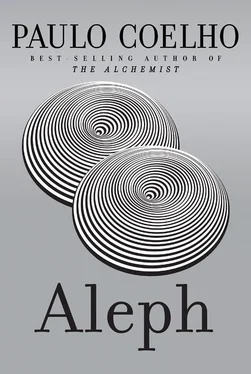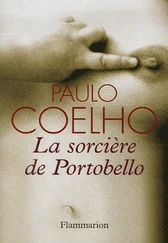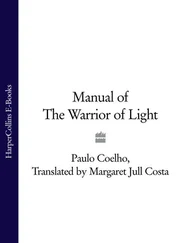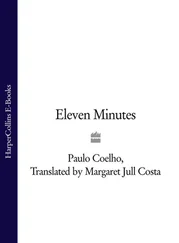We go downstairs, eat some marinated fish for breakfast (the only thing on the menu at that hour), then hear the sound of the car that has come to fetch us drawing up outside. The driver greets us, takes our bags, and puts them in the trunk.
We emerge from the hotel into brilliant sunshine, clear skies, and no wind. The snowy mountains in the distance are clearly visible. I pause to say good-bye to the lake, knowing that I will probably never be back. Yao and Hilal get into the car, and the driver starts the engine.
But I can’t move.
“We’d better go,” he says. “I’ve allowed an extra hour, just in case there’s some accident en route, but I don’t want to risk missing the train.”
The lake is calling to me.
Yao gets out of the car and comes over. “You were perhaps expecting more from that meeting last night with the shaman, but it was very important to me.”
I had, in fact, expected less. Later, I will tell him what happened with Hilal. Now I am looking at the lake, which is dawning along with the sun, its waters reflecting every ray. My spirit had visited it with the eagle of Baikal, but I need to know it better.
“Things aren’t always the way we expect them to be,” he goes on. “But I’m really grateful to you for coming.”
“Is it possible to deviate from the path God has made? Yes, but it’s always a mistake. Is it possible to avoid pain? Yes, but you’ll never learn anything. Is it possible to know something without ever having experienced it? Yes, but it will never truly be part of you.”
And with those words, I walk toward the waters that continue to call to me. I do so slowly at first, hesitantly, unsure as to whether I will reach them. When I feel reason trying to hold me back, I start to walk more quickly, then break into a run, pulling off my winter clothes as I do. By the time I reach the edge of the lake, I am wearing only my underpants. For a moment, for a fraction of a second, I hesitate, but my doubts are not strong enough to prevent me from going forward. The icy water touches first my feet, then my ankles. The bottom of the lake is covered with stones, and I have difficulty maintaining my balance, but I keep going, until the water is deep enough to— dive in!
My body enters the freezing water, I feel thousands of needles pricking my skin, I stay under for as long as I can—a few seconds, perhaps, perhaps an eternity—then I return to the surface.
Summer! Heat!
Later, I realize that anyone moving from a very cold place to a warmer place experiences the same sensation. There I was, with no shirt on, knee-deep in the waters of Lake Baikal, as happy as a child, because I had been enfolded in an energy that was now part of me.
Yao and Hilal had followed me and were watching incredulously from the shore.
“Come on! Come on in!”
They both start getting undressed. Hilal has nothing on underneath and is once again completely naked. But what does that matter? Some people gather on the pier and watch us. But, again, who cares? The lake is ours. The world is ours.
Yao is first in. He doesn’t realize how uneven the bottom of the lake is and falls. He gets up, wades in a little farther, then takes the plunge. Hilal must have levitated over the pebbles, because she enters at a run, going farther out than either of us before plunging in; then she opens her arms to the skies and laughs like a loon.
No more than five minutes could have passed from the moment when I started running toward the lake until the moment we emerged. The driver, beside himself with worry, comes running toward us, bearing towels hastily borrowed from the hotel. We are leaping gleefully up and down, hugging one another, singing, shouting, and saying, “It’s so hot out here!”—like the children we will never, ever cease to be.
FOR THE LAST TIME ON THIS JOURNEY, I adjust my watch. It’s five o’clock in the morning on May 30, 2006. In Moscow, which is seven hours behind, people are still having supper on the night of the 29th.
Everyone in the carriage woke early and found it impossible to get back to sleep, not because of the motion of the train, to which we have become accustomed, but because we will shortly be arriving in Vladivostok, our final stop. We have spent the last two days in the carriage, mostly sitting around the table that has been the center of our universe during this seemingly unending journey. We ate and told stories, and I described what it felt like to plunge into Lake Baikal, although the others were more interested in our meeting with the shaman.
My publishers had a brilliant idea: they would forewarn the stations en route of our arrival time. That way, whether it was day or night, I would get out of the carriage to find people waiting on the platform with books to sign. They thanked me, and I thanked them. Sometimes we stayed for only five minutes, sometimes for twenty. They blessed me, and I gratefully received their blessings, which came from all kinds of people, from elderly ladies in long coats, boots, and head scarves to young men who had just left work or were heading home, usually wearing only a jacket, as if to say, “I’m too tough for the cold to get to me.”
The previous day, I had decided to walk the whole length of the train. This was something I had thought of doing several times but always put off for another day, given that we had such a long journey ahead of us. Then I realized that we were nearly at our final destination.
I asked Yao to go with me. We opened and closed numerous doors, too many to count. Only then did I understand that I wasn’t on a train but in a city, a country, a whole universe. I should have done this before. The journey would have been so much richer; I might have met fascinating people and heard stories I could later turn into books.
I spent the whole afternoon investigating that city on wheels, pausing only to get off whenever we pulled into a station to meet any waiting readers. I walked through that great city as I have through many others and saw all the usual scenes: a man talking on his cell phone, a boy hurrying back to fetch something he had left behind in the dining car, a mother with a baby on her lap, two young people kissing in the narrow corridor outside the compartments, oblivious to the landscape speeding past outside, radios at full blast, signs I couldn’t understand, people offering and asking for things, a man with a gold tooth laughing with friends, a woman in a head scarf weeping and gazing into space. I smoked a few cigarettes with a group of people waiting by the narrow door into the next carriage while discreetly studying those thoughtful, well-dressed men who seemed to have the weight of the world on their shoulders.
I walked through that city, which stretched out like an ever-flowing river of steel, a city where I don’t speak the local language, but what does that matter? I heard all kinds of languages and sounds, and noticed that, as happens in all large cities, most people weren’t talking to anyone, each passenger absorbed in his or her own problems and dreams, forced to share the same compartment with three perfect strangers, people they will never meet again and who have their own problems and dreams to contend with. However miserable or lonely they might feel, however much they would like to share their joy at some triumph or their grief at some overwhelming sadness, it’s always best and safest to keep silent.
I decided to strike up a conversation with someone, a woman of about my own age. I asked if she knew what part of the country we were passing through. Yao began to translate my words, but I stopped him. I wanted to imagine what it would be like to make this journey alone. Would I have made it to the end? I wondered. The woman made a gesture indicating that she couldn’t hear what I was saying above the deafening noise of the wheels on the tracks. I repeated my question, and this time she did hear but didn’t understand. She clearly thought I was slightly touched and hurriedly moved away.
Читать дальше
